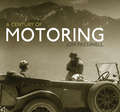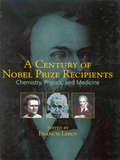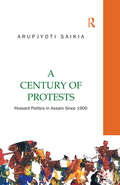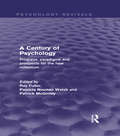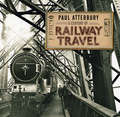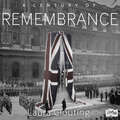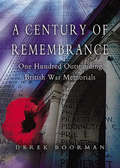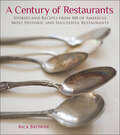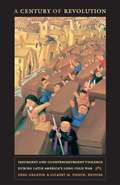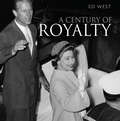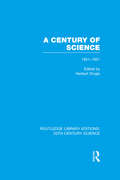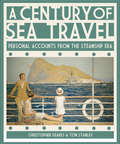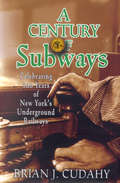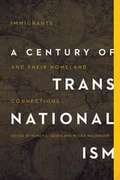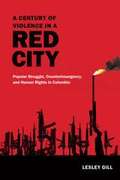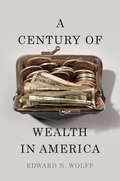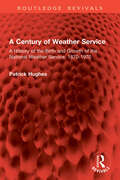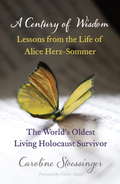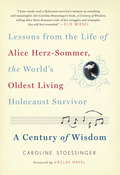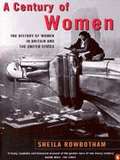- Table View
- List View
A Century of Motoring
by Jon PressnellBy 1914 the motor car had taken its definitive form. Tiller steering had at last disappeareed (in 1911 when Lanchester abandoned it); the front engined rear-wheel drive stystem Panhard was almost universal, unit construction was being essayed (the Lagonda 11.9hp); coachwork was moving away decisively from its horse-carriage roots. A new industry was forming, with mass-production by Ford and Morris poised to drive car-ownership upwards. The First World War, precipitated by the assassination of a car-borne royal, was to be the first motorized conflict, and one that would see a generation of soldiers gaining experience of the automobile.A Century of Motoring charts the progress of motoring from this nodal point to where we are today --more mobile than ever, but with environmental concerns shaping the way cars are made, use, and ultimately discarded. Through 50 carefully-chosen photographs it examines the steady democratization of motoring, the development of the British motor industry, and the place of the car in British life. Along the way it depicts the landmark models that are part of this rich history --the Model T Ford, the Austin Seven, the Jaguar E-type, the Mini --but doesn't forget the oddballs that have added so much color to the motoring scene, specials, and the bubble cars of the Suez era.
A Century of Naval Aviation, 1909–2009: The Evolution of Ships and Shipborne Aircraft
by David WraggAbove the Waves is the history of the first century of British Naval aviation, with personal accounts adding color to the achievements both in technology, such as angled flight decks, mirror deck landing systems, helicopter assault and vertical take-off, and in operations, including the sinking of the Konigsberg and the daring attack on the Italian fleet at Taranto, convoy protection, operations with the United States Navy in the Pacific, then, post-war, Suez, and later the recovery of the Falklands from Argentine invasion.The Royal Navy was in the forefront of aviation from a very early stage. As the author reveals Officers such as the legendary Admiral of the Fleet Lord Fisher quickly recognized the strategic and tactical importance of air power. Winston Churchill, as First Lord of the Admiralty, volunteered the Navy for the air defense of the UK in WW1 but with the formation of the RAF in 1918 the Navy had a fierce fight to retain its own air arms and this is a struggle that has continued up to the present day.Not only are there many thrilling accounts of operations but this fascinating book also includes a chronology of major events. Above the Waves will appeal to those who have served, those who serve today and those who intend to serve in the future, and for their relatives and the many enthusiasts who sense the particular excitement of air operations at sea.
A Century of Nobel Prize Recipients: Chemistry, Physics, and Medicine
by Francis LeroyCelebrating a century of revolutionary contributions to our understanding of life, the world, and the universe, this encyclopedic desk reference traces the discoveries that earned nearly 500 distinguished scientists Nobel honors in the areas of chemistry, physics, and medicine. The School of Library Journal called it "...eye-catching... Original ar
A Century of Palestinian Rejectionism and Jew Hatred
by Sol SternPalestinian President Mahmoud Abbas has launched an international campaign to achieve recognition by the United Nations for an independent Palestinian state. Abbas and his international supporters claim that only Israel (with the United States) stands in the way of this act of historical justice, which would finally bring about peace in the Middle East.In this eye-opening Broadside, Sol Stern debunks the Palestinians' claim and shows that Abbas has been lying about the origins and history of the conflict. Palestinian leaders have rejected partition plans that would have given them much more land for their independent state than the Jews were offered for theirs. Rather than being the innocent victims of a "dispossession" at the hands of the Israelis, the Palestinians rejected reasonable compromises and instead pursued their aim of getting rid of the only Jewish state in the world.
A Century of Protests: Peasant Politics in Assam Since 1900
by Arupjyoti SaikiaAddressing an important gap in the historiography of modern Assam, this book traces the relatively unexplored but profound transformations in the agrarian landscape of late- and post-colonial Assam that were instrumental in the making of modern Assamese peasantry and rural politics. It discusses the changing relations between various sections of peasantry, state, landed gentry, and politics of different ideological hues — nationalist, communist and socialist — and shows how a primarily agrarian question concerning peasantry came to occupy the centre stage in the nationalist politics of the state. It will especially interest scholars of history, agrarian and peasant studies, sociology, and contemporary politics, as also those concerned with Northeast India.
A Century of Psychology: Progress, paradigms and prospects for the new millennium (Psychology Revivals)
by Patricia Noonan Walsh Patrick McGinley Ray FullerPsychology has influence in almost every walk of life. Originally published in 1997, A Century of Psychology is a review of where the discipline came from, where it had reached and where the editors anticipated it may go. Ray Fuller, Patricia Noonan Walsh and Patrick McGinley assembled an internationally recognised team of mainly European experts from the major applications and research areas of psychology. They begin with a critical review of methodology and its limitations and plot the course of gender and developmental psychology. They go on to include discussion of learning, intellectual disability, clinical psychology and the emergence of psychotherapy, educational psychology, organizational psychology, cognitive psychology, neuropsychology and many other topics, in particular community psychology, perception and alternative medicine. Enlightening, reflective and sometimes provocative, A Century of Psychology is required reading for anyone involved in psychology as a practitioner, researcher or teacher. It is also a lively introduction for those new to the discipline.
A Century of Railway Travel
by Paul AtterburyFrom the Edwardian golden age of steam to the present, no mode of travel has captured the hearts of the British people like the railways. In wartime and peace, along major routes and minor, steam, diesel and electric trains, have moved goods, taken commuters to work or families on holidays - a constant presence in an always changing way of life. A Century of Railway Travel tells the story of one hundred years of Britain's railway heritage using striking full-page imagery with commentary from author Paul Atterbury who explains the controversial history and unique appeal of the railways. His expert eye steers the reader through the last hundred years, from the heyday of steam to the tragedy that was Beeching and rail's recent revival. The book stops to consider the great steam engines, the drivers, luggage, passengers, postcards, tickets, station scenes and carriage interiors we all like to remember.
A Century of Remembrance
by Laura CloutingThe scale and nature of the First World War, and the manner in which the dead were treated, created conditions in which a very particular language of grief and remembrance of the war dead flourished.A Century of Remembrance explores the deeply personal ways in which people mourned their loved ones, and memorialised them, and examines the cornerstones of national-scale remembrance that took hold in Britain throughout the 1920s, from the poppy to the cenotaph.(P)2020 Headline Publishing Group Limited
A Century of Remembrance: One Hundred Outstanding British War Memorials
by Derek BoormanA Century of Remembrance is a study of one hundred outstanding United Kingdom war memorials which commemorate 20th century conflicts from the Boer War to the Falklands and Gulf wars. The first described is a Boer War memorial unveiled on 5 November 1904, and the last is the Animals in War memorial unveiled in London on 24 November 2004.The memorials chosen are listed as near as possible in chronological order and represent different wars, different artists, different areas of the country, and a variety of types of memorial. In category they range from individual to national memorials and include memorials in schools, churches and places of work, and examples representing communities and the armed services. In form they are from statues and stained glass windows to arches, obelisks and cenotaphs, and from cloisters and chapels to art galleries and gardens and even a carillon.
A Century of Restaurants: Stories and Recipes from 100 of America's Most Historic and Successful Restaurants
by Rick BrowneFrom the public television host, a tour of the US’s oldest and greatest dining spots—with “delightful tales, delicious recipes, and hundreds of photographs” (Ted Allen, host of Food Network’s Chopped).Come along on a pilgrimage to some of the oldest, most historic restaurants in America. Each is special not only for its longevity but also for its historic significance, interesting stories, and, of course, wonderful food. The oldest Japanese restaurant in the country is profiled, along with stagecoach stops, elegant eateries, barbecue joints, hamburger shops, cafes, bars and grills, and two dueling restaurants that both claim to have invented the French dip sandwich.The bestselling author and host/producer of Barbecue America shares the charm, history, and appeal that made these establishments, some as many as three hundred years old, successful. Each profile contains a famous recipe, the history of the restaurant, a look at the restaurant today, descriptions of some of its signature dishes, fun facts that make each place unique, and beautiful photos. It’s all you need for an armchair tour of one hundred restaurants that have made America great.“Browne spent three years traveling more than 46,000 miles to profile the 100 restaurants, inns, taverns and public houses he selected as being the most historic, most interesting and most successful.” —Orlando Sentinel“It is Browne’s exploration of the history behind each place that I found most interesting…The White Horse Tavern gave him the Beef Wellington recipe. Peter Luger, the legendary Brooklyn Steakhouse, shared one for German Fried Potatoes and Katz’s Delicatessen in New York City offered Katz’s Noodle Kugel. And, Ferrara in Little Italy in New York City parted with its cannoli recipe.” —Sioux City Journal“Ask any chef: It’s not easy keeping a restaurant alive for a week, let alone a year or a decade. So what does it take to last a century? After five years of criss-crossing the country and gobbling up regional specialties from chowder to chili, Rick Browne reveals the answer to that question.” —Ted Allen, host of Food Network’s Chopped
A Century of Restaurants: Stories and Recipes from 100 of America's Most Historic and Successful Restaurants
by Rick BrowneFrom the public television host, a tour of the US’s oldest and greatest dining spots—with “delightful tales, delicious recipes, and hundreds of photographs” (Ted Allen, host of Food Network’s Chopped).Come along on a pilgrimage to some of the oldest, most historic restaurants in America. Each is special not only for its longevity but also for its historic significance, interesting stories, and, of course, wonderful food. The oldest Japanese restaurant in the country is profiled, along with stagecoach stops, elegant eateries, barbecue joints, hamburger shops, cafes, bars and grills, and two dueling restaurants that both claim to have invented the French dip sandwich.The bestselling author and host/producer of Barbecue America shares the charm, history, and appeal that made these establishments, some as many as three hundred years old, successful. Each profile contains a famous recipe, the history of the restaurant, a look at the restaurant today, descriptions of some of its signature dishes, fun facts that make each place unique, and beautiful photos. It’s all you need for an armchair tour of one hundred restaurants that have made America great.“Browne spent three years traveling more than 46,000 miles to profile the 100 restaurants, inns, taverns and public houses he selected as being the most historic, most interesting and most successful.” —Orlando Sentinel“It is Browne’s exploration of the history behind each place that I found most interesting…The White Horse Tavern gave him the Beef Wellington recipe. Peter Luger, the legendary Brooklyn Steakhouse, shared one for German Fried Potatoes and Katz’s Delicatessen in New York City offered Katz’s Noodle Kugel. And, Ferrara in Little Italy in New York City parted with its cannoli recipe.” —Sioux City Journal“Ask any chef: It’s not easy keeping a restaurant alive for a week, let alone a year or a decade. So what does it take to last a century? After five years of criss-crossing the country and gobbling up regional specialties from chowder to chili, Rick Browne reveals the answer to that question.” —Ted Allen, host of Food Network’s Chopped
A Century of Revolution: Insurgent and Counterinsurgent Violence During Latin America's Long Cold War
by Greg Grandin Gilbert M. JosephLatin America experienced an epochal cycle of revolutionary upheavals and insurgencies during the twentieth century, from the Mexican Revolution of 1910 through the mobilizations and terror in Central America, the Southern Cone, and the Andes during the 1970s and 1980s. In his introduction to A Century of Revolution, Greg Grandin argues that the dynamics of political violence and terror in Latin America are so recognizable in their enforcement of domination, their generation and maintenance of social exclusion, and their propulsion of historical change, that historians have tended to take them for granted, leaving unexamined important questions regarding their form and meaning. The essays in this groundbreaking collection take up these questions, providing a sociologically and historically nuanced view of the ideological hardening and accelerated polarization that marked Latin America's twentieth century. Attentive to the interplay among overlapping local, regional, national, and international fields of power, the contributors focus on the dialectical relations between revolutionary and counterrevolutionary processes and their unfolding in the context of U. S. hemispheric and global hegemony. Through their fine-grained analyses of events in Chile, Colombia, Cuba, El Salvador, Guatemala, Mexico, Nicaragua, and Peru, they suggest a framework for interpreting the experiential nature of political violence while also analyzing its historical causes and consequences. In so doing, they set a new agenda for the study of revolutionary change and political violence in twentieth-century Latin America. Contributors Michelle Chase Jeffrey L. Gould Greg Grandin Lillian Guerra Forrest Hylton Gilbert M. Joseph Friedrich Katz Thomas Miller Klubock Neil Larsen Arno J. Mayer Carlota McAllister Jocelyn Olcott Gerardo Rnique Corey Robin Peter Winn
A Century of Royalty
by Edward WestOver the last century Britain has witnessed a royal family saga compelling, tumultuous and heartwarming. The constitution has been thrown into crisis by an abdication, royal divorces have become commonplace, coronations and jubilees have brought the nation together - and though Princess Diana's death precipitated perhaps the most serious turn in public opinion yet, the Windsors' place in our hearts was confirmed beyond any doubt by Elizabeth II'sDiamond Jubilee and the birth of the Duke and Duchess of Cambridge's son, Prince George. With full-page illustrations from the Daily Mirror's archives and illuminating explanatory text, this book is a unique look at one hundred years of royalty in Britain. The British Royal Family: beloved worldwide, poised and gracious, and above all resilient. With striking images from the Daily Mirror's famous archive and expert text from Ed West, A Century of Royalty looks from unexpected angles at these fascinating lives, controversies and traditions, from Edward VII's coronation to the birth of Prince George in 2013.
A Century of Science 1851-1951 (Routledge Library Editions: 20th Century Science)
by Herbert DingleFirst published in 1951 to coincide with the British Festival, this book explores the developments in science which had occurred since the Great Exhibition of 1851. Covering the full range of scientific development which had emerged in that time – from fundamental physics to evolution and genetics, and from geology to medical surgery – this accessible collection of essays charts with impressive comprehension and clarity the momentous changes which had occurred in the pursuit of science since the mid-nineteenth century, and ably demonstrates the appropriateness of citing the twentieth century as the advent of the scientific age. A Century of Science will appeal to those interested in the history of science, those wishing to ground their knowledge of specific scientific disciplines in a broader understanding of the subject, and also to the general reader who values scientific progress and the questions it continues to raise.
A Century of Sea Travel: Personal Accounts from the Steamship Era
by Christopher Deakes Tom StanleyThis &“handsome volume&” offers a &“lavishly illustrated&” journey back to the golden age of steam travel through first-hand accounts and images of the passengers (Bruce Peter, author of Ship Style). A Century of Sea Travel is an eye-opening voyage through the golden years of the passenger steamship, a voyage described by the very travelers who sailed on these magnificent engineering marvels. In memoirs and letters home, diaries and the backs of postcards, the recorded experiences of every aspect of steamship travel are here relived: from details of the ships, the crew, and fellow passengers; to the food and entertainment on board; to tales of romance, accidents, and disasters; and of being dreadfully sick during storms at sea. The writers were emigrants or colonial rulers, men of letters, young men seeking their fortune, wives on their way to new homes abroad; some were rich, many were poor and escaping the hardship of downtrodden lives. All had in common the experience of voyaging at sea. Vividly brought to life by full-color and black-and-white postcards, travel posters, promotional brochures, fine art, photographs, maps, luggage labels, health inspection certificates, and itineraries, the authors have woven together word and image into a page-turning narrative that evocatively describes an age (1840–1950) now lost to time.
A Century of Service
by David C. ForwardThe story of Rotary International and the Rotarians contributions to the society
A Century of Subways: Celebrating 100 Years of New York's Underground Railways
by Brian J. CudahyThe transit historian and author of Under the Sidewalks of New York delivers a lively and authoritative history of New York City&’s fabled subway. On the afternoon of October 27, 1904, ordinary New Yorkers descended beneath the sidewalks for the first time to ride the electric-powered trains of the newly inaugurated Interborough Rapid Transit System. More than a century later, the subway has expanded greatly, weaving its way into the fabric of New York&’s unique and diverse urban life. In A Century of Subways, transit historian Brian J. Cudahy offers a fascinating tribute to New York&’s storied and historic subway system, from its earliest beginnings and many architectural achievements, to the ways it helped shape today&’s modern metropolis. Taking a fresh look at one of the marvels of the twentieth century, Cudahy creates a vivid sense of this extraordinary system and the myriad ways the city was transformed once New Yorkers started riding below the ground.
A Century of Transnationalism: Immigrants and Their Homeland Connections
by Roger Waldinger Nancy L. GreenThis collection of articles by sociologically minded historians and historically minded sociologists highlights both the long-term persistence and the continuing instability of home country connections. Encompassing societies of origin and destination from around the world, A Century of Transnationalism shows that while population movements across states recurrently produce homeland ties, those connections have varied across contexts and from one historical period to another, changing in unpredictable ways. Any number of factors shape the linkages between home and destination, including conditions in the society of immigration, policies of the state of emigration, and geopolitics worldwide. Contributors: Houda Asal, Marie-Claude Blanc-Chaléard, Caroline Douki, David FitzGerald, Nancy L. Green, Madeline Y. Hsu, Thomas Lacroix, Tony Michels, Victor Pereira, Mônica Raisa Schpun, and Roger Waldinger
A Century of U.S. Naval Intelligence
by Wyman H PackardThis work is the product of a gratifying cooperation between the Office of Naval Intelligence and the Naval Historical Center, which throughout the project has provided major support to Capt. Packard’s researches and which saw this volume through the publication process. The joint effort is intended to provide intelligence professionals, scholars, and the general public with a detailed, topical accounting of the long and varied activities of U.S. Naval Intelligence on behalf of the nation. Equally important, it is hoped that the book’s detailed references to resources for further research will spark more work in a field that has not been adequately explored by historians in the past.The role of naval intelligence in the success of the U.S. armed forces in time of war and in periods of often precarious peace deserves wider appreciation; Capt. Packard has indeed performed a magnificent service to the Office of Naval Intelligence through his painstaking laborsNaval intelligence is the accumulated knowledge on the naval science and developments in all maritime countries; the naval capabilities, activities, and intentions of all potentially hostile and friendly countries; and the characteristics of all possible areas of naval operations. It has been a requirement within the U.S. Navy ever since intelligence was used to justify the procurement of the Navy’s first ships.Additionally, naval intelligence includes the Navy’s contribution to joint military and national intelligence efforts.
A Century of Violence in a Red City: Popular Struggle, Counterinsurgency, and Human Rights in Colombia
by Lesley GillIn A Century of Violence in a Red City Lesley Gill provides insights into broad trends of global capitalist development, class disenfranchisement and dispossession, and the decline of progressive politics. Gill traces the rise and fall of the strong labor unions, neighborhood organizations, and working class of Barrancabermeja, Colombia, from their origins in the 1920s to their effective activism for agrarian reforms, labor rights, and social programs in the 1960s and 1970s. Like much of Colombia, Barrancabermeja came to be dominated by alliances of right-wing politicians, drug traffickers, foreign corporations, and paramilitary groups. These alliances reshaped the geography of power and gave rise to a pernicious form of armed neoliberalism. Their violent incursion into Barrancabermeja's civil society beginning in the 1980s decimated the city's social networks, destabilized life for its residents, and destroyed its working-class organizations. As a result, community leaders are now left clinging to the toothless discourse of human rights, which cannot effectively challenge the status quo. In this stark book, Gill captures the grim reality and precarious future of Barrancabermeja and other places ravaged by neoliberalism and violence.
A Century of Wealth in America: A Study Of The Increasing Inequality Of Wealth In America (Twentieth Century Fund Papers)
by Edward N. WolffUnderstanding wealth—who has it, how they acquired it, how they preserve it—is crucial to addressing challenges facing the United States. Edward Wolff’s account of patterns in the accumulation and distribution of U.S. wealth since 1900 provides a sober bedrock of facts and analysis. It will become an indispensable resource for future public debate.
A Century of Weather Service: A History of the Birth and Growth of the National Weather Service, 1870-1970 (Routledge Revivals)
by Patrick HughesFirst Published in 1970, A Century of Weather Service provides a comprehensive history of the birth and growth of the National Weather Service from 1870 to 1970 in America. It discusses important themes such as coping with disaster; American weather pioneers; a military weather service; The United States Weather Bureau; the air commerce age; weather in war; growth of a global weather service; calculated weather risks; the air we breathe; and one world of weather. The book closes with a chronology of the meteorological milestones of the American weather services from 1644 to 1970.This is an important historical work for students of environmental geography and general readers interested in the topic.
A Century of Wisdom: Lessons from the Life of Alice Herz-Sommer, Holocaust Survivor
by Caroline StoessingerAlice Herz-Sommer, 1903-2014The pianist Alice Herz-Sommer survived the Theresienstadt concentration camp, attended Eichmann's trial in Jerusalem, and along the way befriended some of the most fascinating historical figures of our time, from Franz Kafka to Gustav Mahler, Leonard Bernstein and Golda Meir. A Century of Wisdom is her story: a testament to the bonds of friendship, the power of music and the importance of leading a life of maternal simplicity, intellectual curiosity, and never-ending optimism.
A Century of Wisdom: Lessons from the Life of Alice Herz-Sommer, the World's Oldest Living Holocaust Survivor
by Vaclav Havel Caroline StoessingerAn inspiring story of resilience and the power of optimism--the true story of Alice Herz-Sommer, the world's oldest living Holocaust survivor. At 108 years old, the pianist Alice Herz-Sommer is an eyewitness to the entire last century and the first decade of this one. She has seen it all, surviving the Theresienstadt concentration camp, attending the trial of Adolf Eichmann in Jerusalem, and along the way coming into contact with some of the most fascinating historical figures of our time. As a child in Prague, she spent weekends and holidays in the company of Franz Kafka (whom she knew as "Uncle Franz"), and Gustav Mahler, Sigmund Freud, and Rainer Maria Rilke were friendly with her mother. When Alice moved to Israel after the war, Golda Meir attended her house concerts, as did Arthur Rubinstein, Leonard Bernstein, and Isaac Stern. Today Alice lives in London, where she still practices piano for hours every day. Despite her imprisonment in Theresienstadt and the murders of her mother, husband, and friends by the Nazis, and much later the premature death of her son, Alice has been victorious in her ability to live a life without bitterness. She credits music as the key to her survival, as well as her ability to acknowledge the humanity in each person, even her enemies. A Century of Wisdom is the remarkable and inspiring story of one woman's lifelong determination--in the face of some of the worst evils known to man--to find goodness in life. It is a testament to the bonds of friendship, the power of music, and the importance of leading a life of material simplicity, intellectual curiosity, and never-ending optimism.Foreword by Václav HavelFrom the Hardcover edition.
